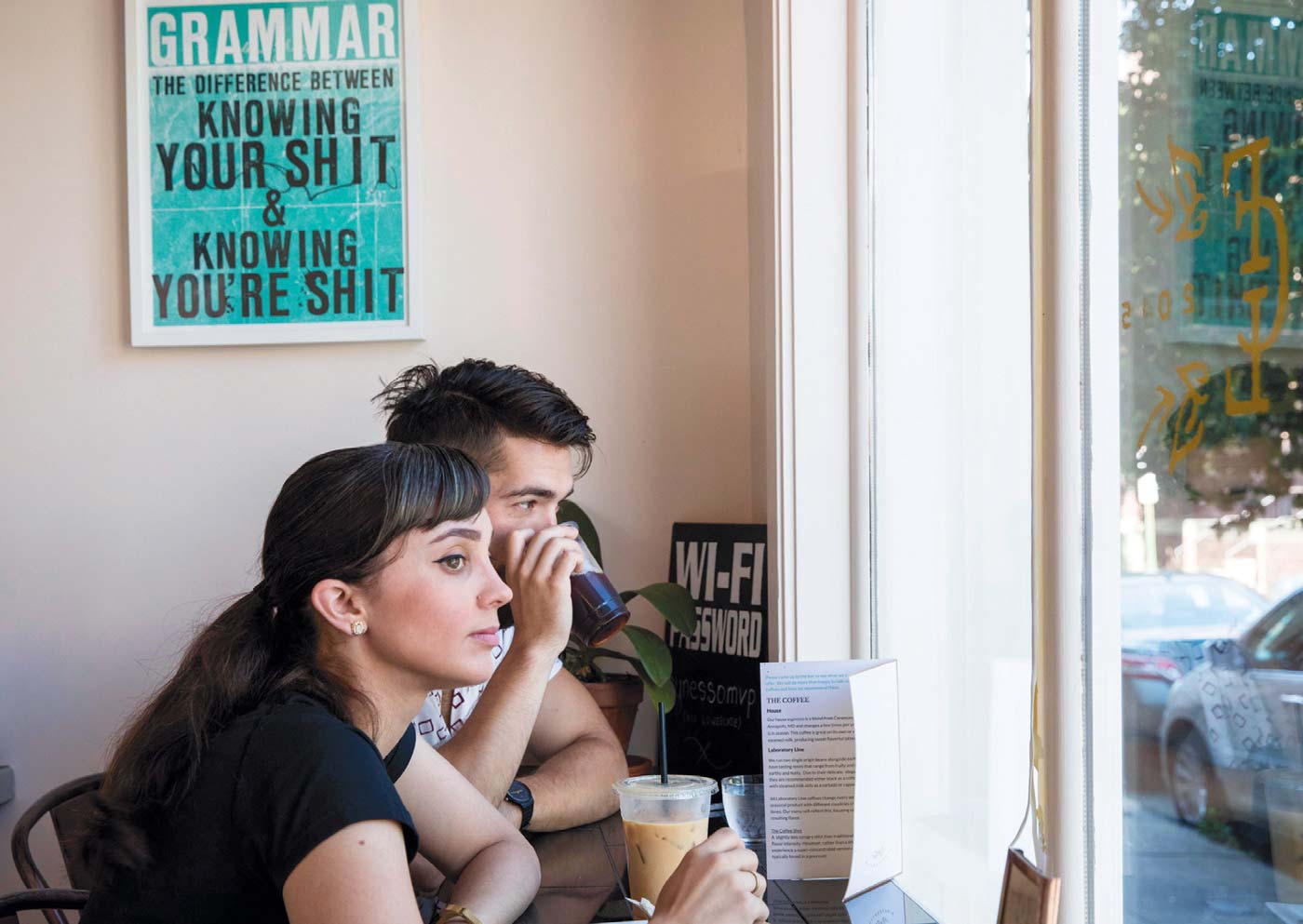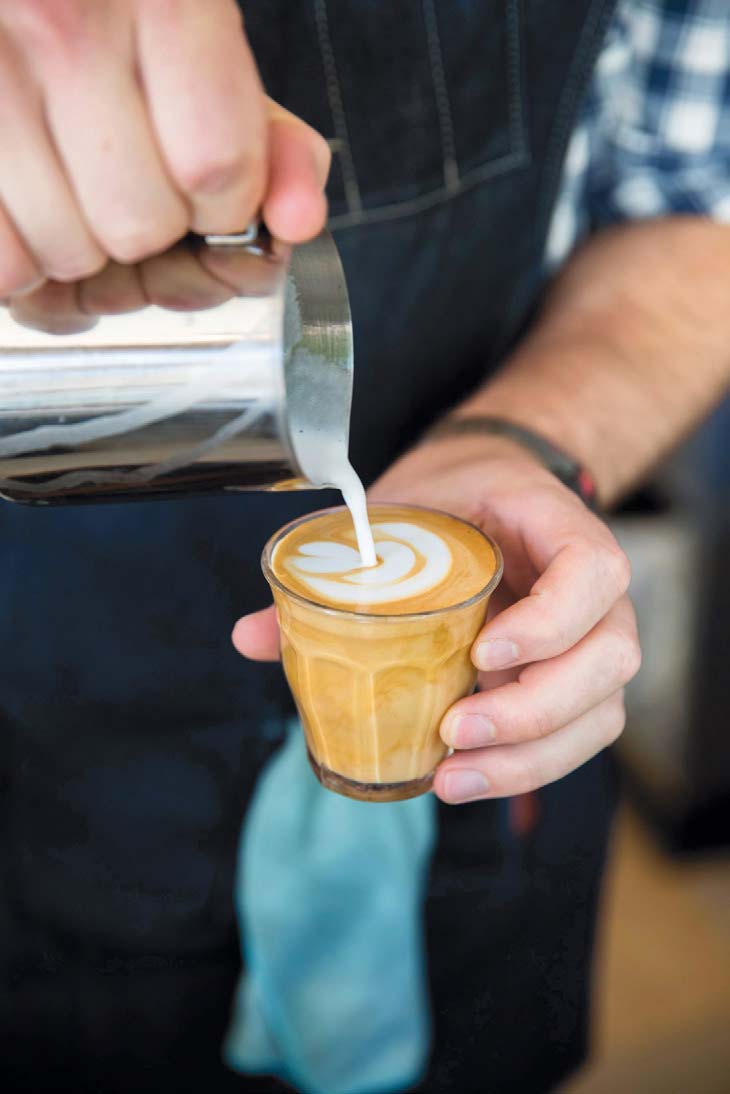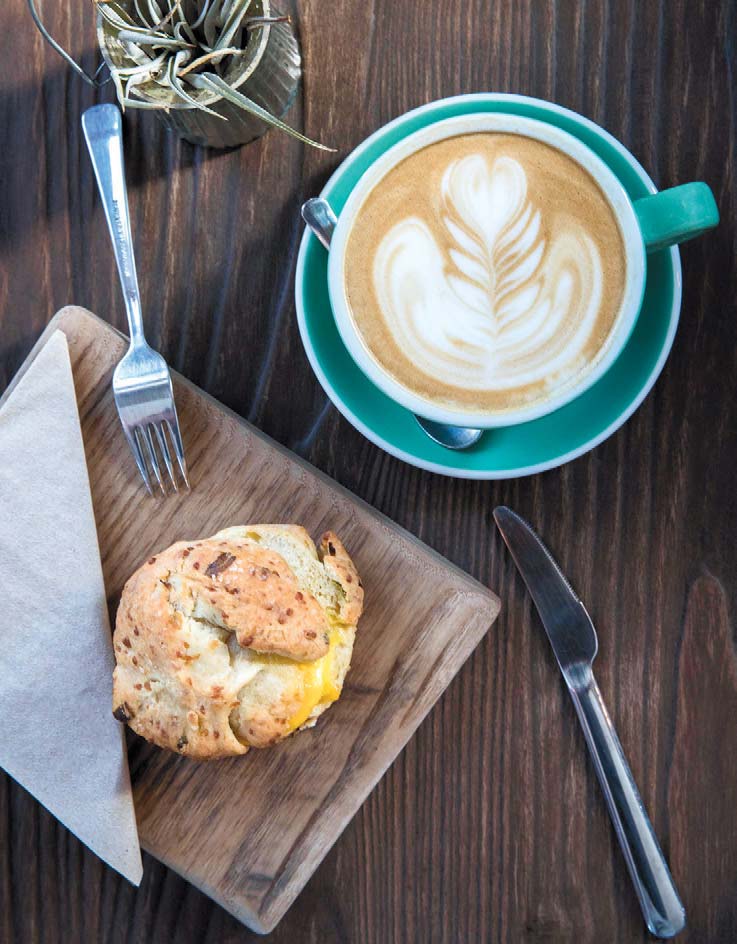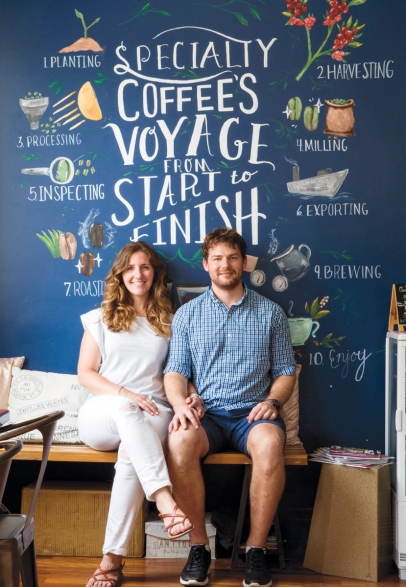How to Succeed in (Coffee) Business
Function Coffee Labs takes over a seemingly doomed location in Bella Vista
To a passerby, the corner of Tenth and Carpenter Streets looks like a prime location for a neighborhood coffee shop. It’s just a block off the Italian Market and across the street from a little park with picnic tables and a bocce court shaded by oak trees. The surrounding—neighborhood Bella Vista—is mostly residential.
All of which makes it appealing to a wannabe coffee-shop owner. Half a dozen cafes have tried to make a go of it there in the past decade. InFusion Café and Tea Gallery (2007-08), Mazag Café (2008-11), Filter (2011-12), Books and Beans/Brown Sugar Café (February-June 2012), and Down Dog Healing Café (2012-15)—a quick succession of openings and closings that have given the location its reputation as a doomed corner.
But Function Coffee Labs, which opened in the space in April, 2016, seems poised to turn things around. Co-owners Ross Nickerson and Megan McCusker knew about the long line of failed businesses when they chose the location, but they were still confident about setting up shop. “We didn’t feel like [past] failures would be an indication of how we would do,” Nickerson says.
Their coffee shop, they vowed, would be different.
Many of the previous coffee shops that opened in this spot had a secondary focus, like Down Dog’s Ayurvedic drinks or InFusion’s artwork. Nickerson and McCusker planned to prioritize really good coffee. They’d use technical methods and careful bean sourcing to offer an expansive range of flavors, and they’d do it in a warm neighborhood environment.
One recent Saturday, every seat in Function Coffee Labs was full. A group of young women sat with their laptops open, two friends chatted over cups of coffee, and a man leaned over a newspaper as he sipped his cappuccino. The line stretched from the front door to the register.
“We’ve only had business pick up since we opened,” says McCusker. They’ve drawn dependable neighborhood regulars, coffee fanatics, and tourists who make pilgrimages from Center City. As they settle into their second year of business, McCusker and Nickerson are already looking to open a second location.
Before choosing their location in Bella Vista, Nickerson and McCusker looked at properties in a lot of other neighborhoods. They scoped out Pennsport, East Passyunk, Fishtown, and Mount Airy. They needed to strike the right balance between rent cost, population density, and proximity to comparable coffee shops.
The couple was ultimately looking to open in a neighbourhood where they would want to live. “We are our target customer,” Nickerson says—young professionals with more expendable income for luxuries like, say, exceptional coffee. That’s an apt description of the demographic that’s moved into Bella Vista in the past decade.
“We loved that it was a corner shop, the price was right, the park across the street was a big sell, and it was a turnkey business,” McCusker says. “Which seriously cut down on our start-up costs.” As Nickerson saw it, the shop was in the middle of a rare hole in the city—someone would have to travel pretty far in any direction for coffee comparable to what they’d serve.
Of course there are drawbacks to opening in a location with such high turnover history. “We were slightly worried that people would walk by and think, ‘There’s another place that’s going to close soon—why would I go in?’” Nickerson says.
But they didn’t buy the whole “doomed corner” thing. “There are plenty of other neighborhood-y coffee shops in Philly that are not on some big commercial corner, and they do fine,” Nickerson says. The success of shops like Rival Bros., Shot Tower, and Ultimo is not due to foot traffic.
Vincent Stipo is a real estate and hospitality consultant at MSC Retail who works with clients including Rival Bros. He understands coffee-shop owners’ differing strategies in seeking out locations. “They’re either looking for the density of the central business district, foot traffic, and access to the most amount of people,” he says, “or they’re motivated by growing with a neighborhood.”
Nickerson and McCusker were confident that their concept would be good enough to grow with Bella Vista, a rapidly developing neighborhood. (After Philadelphia’s Actual Value Initiative reassessed land values in 2013, the market value of 1001 South Tenth Street nearly quadrupled—rising from $66,600 to $256,000 in a single year.)
When InFusion Café and Tea Gallery opened in 2007, co-owner Jason Huber says the neighborhood was already up-and-coming. “Downtown was expanding, and Bella Vista was really desirable,” he says, which was why he chose Tenth and Carpenter for the second location of his Mount Airy-based business. But he didn’t get the customer volume he expected. Longtime residents were set in their coffee routines at Anthony’s or Gleaner’s on the Italian Market, and there just weren’t enough latte connoisseurs around (yet). “It might have been too soon,” he says. “Timing is a really important piece.”
Most of the development in the neighborhood since has been residential, bringing in new families and generally higher income levels. “Any development and growth and change in what Bella Vista has become over the last few years is only helping the small businesses,” Stipo says. A coffee shop opening now has a significant advantage over one that opened in 2007.
Nickerson and McCusker believed that this wasn’t the only advantage they would have over the previous businesses that had closed. They researched those businesses’ websites and read reviews. They knew Function Coffee Labs would be different, with a serious and scientific approach to coffee that would be new to the neighborhood. “Yes, we’re a coffee shop, just like all the other places were,” Nickerson says, “but we’re such a different business.” They had a deliberate concept based on years of research—a component arguably as important as location to a business’s success.

Eza Koch and Taylor Caputo at Function Coffee Lab
Nickerson and McCusker were teachers in England when they first had the idea to open a coffee shop. McCusker, who studied psychology, anthropology, and business at Columbia University, was drawn to cafés for the community gathering aspect. Nickerson, who graduated with a degree in mechanical engineering from the University of Pennsylvania, became obsessed with understanding the high-level coffee preparation techniques used to extract unique flavors.
Together, they visited more than a hundred cafés across Europe to find inspiration for their own concept. “We used to travel around with this little notebook—the great ideas notebook,” McCusker says. “We’d write the name of the café, what we liked, what we didn’t like, and what kind of coffee we had there.”
One standout was Boot Café in Paris. The tiny place has one short countertop and two high tables, and is housed in an old cobbler’s shop. McCusker and Nickerson remember the friendly Aussie barista behind the counter. “Lloyd created this environment where everyone would start talking to each other,” McCusker says. It wasn’t just about the coffee.
“More people are looking for connection when they go to a coffee shop,” McCusker adds. “That was important to us—that we had a small space where people could meet and join in conversation.”
Their experience at Colonna & Small’s Specialty Coffee in Bath, England, was also influential. The shop’s front window poses a question in big block letters: “How can region, variety, processing, roast, age, and brew method affect the flavour of your cup of coffee?” Their menu entices customers with tasting notes that are far flung from the flavors typically associated with coffee—and they deliver.
“I had this cortado that they said was going to taste like pistachio and shortbread, and I actually tasted those different flavors,” McCusker says.
It was a surprising discovery that they wanted to share. “We wanted to show a different side of something so familiar to people,” McCusker says. Which is why Function’s menu lists tasting notes for each of their four featured coffees (which constantly change) and why they are so meticulous about the preparation of each drink they serve.
On a recent morning, Andrew Savidge sat at a sunny table at Function Coffee Labs in a light gray suit. The 33-year-old financial advisor was working from home for the day. He sipped a pour over made with beans from Gicherori, Kenya, roasted by Tim Wendelboe—widely considered to be one of the best coffee roasters in the world. It’s supposed to taste like raspberry and candied fruit.

“How does it taste?” Nickerson asked Savidge, leaning over the counter. “It’s really good,” Savidge said, nodding. “And it does have a raspberry note to it.”
Savidge doesn’t have a regular order at Function, because the coffees on the menu are always rotating. Different preparations change the flavor of the coffee, too: made as a pourover, the Thimu, Kenya, might taste like doughnut or fig, but add milk for a cappuccino and it’s closer to blackberry pie. Savidge asks Ross what to order, because he knows he’ll get a good recommendation. “You can see how much he cares about the product,” Savidge says.
Each time Nickerson finds a new coffee from a likely obscure roaster to put on the menu, he’s at the shop early, pulling shots and making pourovers, adjusting dials on the grinder and doublechecking a series of scales. To the coffee-obsessed barista, it’s crucial to control every possible variable that affects the coffee’s flavor. “The taste of the coffee is a function of the grind size, the brew ratio, the water temperature, and the contact time,” he says.
To customers like Savidge, who moved into the apartment complex just two blocks away in 2011, Nickerson’s attention to detail and the resulting unusual coffee are a draw. But the owners know they won’t spark everyone’s interest in specialty coffees with fanciful flavors, and they have plenty of customers who opt to skip the tasting education.
Like Roy Coco, who stops into Function every morning on his way to work. He was the very first customer, and he’s ordered his twelve-ounce black drip coffee there almost every weekday since. He appreciates the pleasant service from the “mad scientist meets barista,” as he describes Nickerson.
Coco has lived in Bella Vista for 28 years. “I moved to the city before it was fashionable,” he says. He bought a row house on Kimball, where the kids who played in the street were troublemakers with working-class parents. The 28-year-old from South Jersey was the yuppie on the block.
Back then, the corner of Tenth and Carpenter was a neighbourhood hangout for first-generation Italian Americans. Coco remembers the “old boys” smoking, shooting pool, and eating potato chips while the younger men played bocce in the park across the street.
“When I moved, it was probably 90 percent old-timers and 10 percent newcomers,” Coco says, “Now it’s flipped.”
Claire Johnsen and Justin Kuntz, both in their early twenties, moved to their apartment on Tenth and Washington last July. They’re regular customers too. “We’re in here every day, sometimes twice a day,” Kuntz says, laughing.
Late on a weekday morning, they sat on the stools by the window, eating a chocolate croissant and an apple-cranberry hand pie. They’re both servers at local restaurants. They drink a lot of coffee and appreciate the quality of Function’s drinks. “When we moved, I was like, ‘Thank God, this place is here,’” Kuntz says.
Clearly, Function has wide appeal in Bella Vista. “We’re a hybrid of a neighborhood coffee shop, where we know just about everyone that comes in here,” Nickerson says, “and at the same time, we’re doing very cutting-edge coffee.”
It’s a winning combination that makes it easy to imagine Function Coffee Labs becoming a permanent fixture on this ever-changing corner. Their regulars certainly hope so.
FUNCTION COFFEE LABS
1001 S. 10th St.
267.606.6734
functioncoffeelabs.com

Writer & Editor's Note:
In light of the recent firing of a transgender employee at Function Coffee Labs, we’d like to add a note to this piece, which was written and printed prior to the incident.
Disrespectful behavior towards workers in the service industry is not uncommon; harassment is directed at many oppressed groups including people of color, women and the queer community daily. Employers can learn how best to address workplace harassment by seeking resources that provide fundamental education and training, like AORTA (the Anti-Oppression Resource Training Alliance) and The Bryson Institute.
It’s crucial that we understand – as caring and compassionate individuals and businesses – the need to educate ourselves and take action against oppression in our communities.





